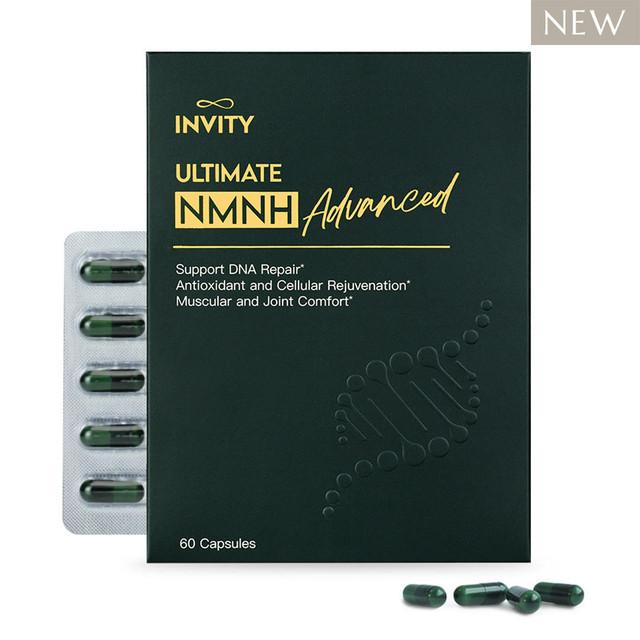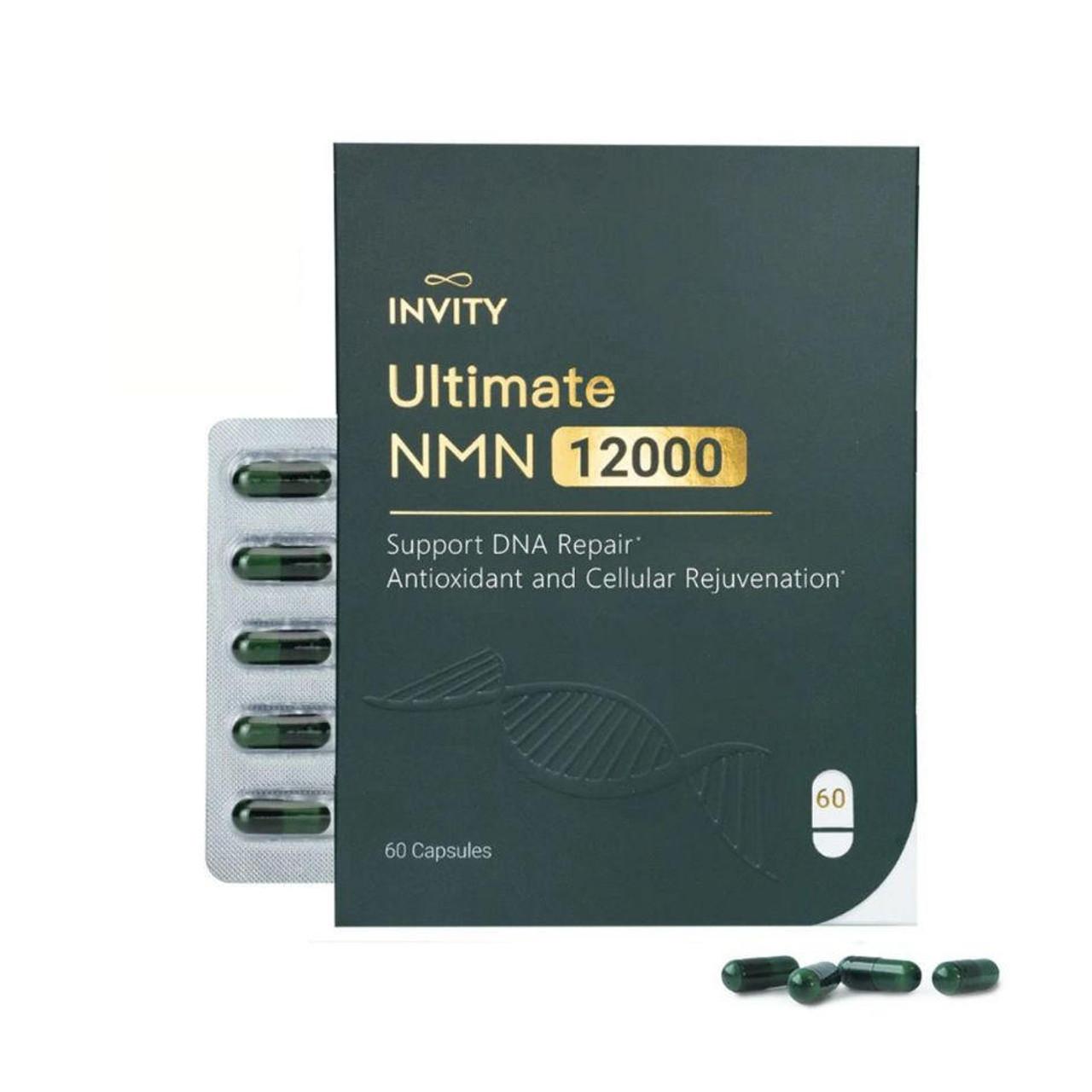Strengthen Your Immunity With NAD+
Posted by Invity team on 28th Jun 2024

We all want good immunity to protect our bodies and stay healthy. Did you know that NAD+ is a powerful tool your body uses to strengthen your immunity, boost your energy and age more healthily?
Think of the coenzyme NAD (nicotinamide adenine dinucleotide) as a special ‘helper’ molecule in your body. The problem is that its levels in our body decline as we age, which can have a big impact on our health and vitality.
Let’s explore this incredible coenzyme that performs many critical processes in our body and find out how we can maintain our NAD+ levels.
What is NAD+?
NAD is a critical coenzyme found in every living cell in our body. It helps with important tasks like turning food into energy and repairing damaged DNA. It is involved in hundreds of incredibly important metabolic processes that are essential to maintaining life.
Even if you haven’t heard of NAD+, you certainly know about vitamins. Our bodies makes NAD+ from foods and nutritional supplements we eat that are rich in NAM and NMN:
Nicotinamide (NAM) is a water-soluble form of vitamin B3 (niacin) and it is a major constituent of NAD+, which is the final, active form of NAD.
NAM is a precursor to NMN (Nicotinamide mononucleotide). It plays an important role in making NAD+ in the body.
So, when we have a vitamin B3 deficiency, this hinders the body’s ability to make sufficient NAD+. This can impact the normal functioning of various metabolic and cellular processes that rely on NAD+ for energy and repair.
NAD, NAD+ and NADH: What’s the difference?
NAD is the blanket name for the coenzyme’s two forms – NAD+ and NADH.
NAD+ is the active, energetic form of the molecule. It's ready to be used to perform many important tasks.
NADH, on the other hand, is the spent form (imagine a used-up battery) after it has given away its energy to help your body function. However, it can be recharged. Your body converts NADH back into NAM. NAM is then turned into NMN, and finally back into NAD+, which is a fully charged battery ready to provide energy again.
All clear? Now let us delve into the incredible facts about NAD.
Keeping a good balance
NAD+ and its companion coenzyme NADH are essential for creation of energy and to regulate pivotal processes in the body. The ratio of NAD+ and NADH should be balanced. This is very important for a healthy life.
An imbalance in NAD+/NADH can destabilise the cellular environment (cellular homeostasis), and it can cause the serious disease pellagra.[1]
Functions of NAD+
NAD+ plays an important role in metabolism
Metabolism involves the biochemical processes that occur within every living organism. NAD+ is involved in energy-producing metabolic reactions to maintain the living system.
NAD+ is also linked to the ageing or longevity process
Interesting fact: A decrease in NAD+ levels has been associated with ageing and neurodegenerative diseases, as well as osteoarthritis, which is why the NAD+/NADH balance is important.[2,3]
The role of NAD+ in immunity
Did you know that NAD+ also regulates your immune system?
- It reduces free-radical damage, which causes cell injury and inflammation and reduced immunity.
- NAD+ also activates the innate immune system.[4,5] This system acts as our first line of defence (immune response) against invading pathogens (germs) or infectious agents like bacteria or viruses.
- NAD+ plays a big role in inflammation and generates an immune response in ageing, infection, cancer and other diseases.
When we have an infection, inflammation is one of the first responses. NAD+ regulates the inflammatory response in immune cells.[2]
NAD+ and infection
Increased NAD+ levels help boost the immune system, which can help the body fight against the COVID-19 infection, among other diseases.[5,7]
NAD+ and cancer
NAD+ is thought to be a key factor in anticancer response. NAD+ supplementation may boost the anticancer activity of T cells (one of the important blood cells that play a central role in immune response).[8]
NAD+ and ageing-related diseases
The link to NAD+ depletion and ageing is the most explored area of research.
Sirtuin proteins, our so-called ‘longevity genes’, are involved in DNA repair, stress response, and metabolism regulation. They are also linked to the regulation of our lifespan (how long we will live).
Studies show that reduced NAD+ is linked to a significant reduction in sirtuin activity.[2]
- NAD+ acts as a fuel that powers sirtuin. And when we activate sirtuin and add more NAD+ through supplementation, it might help us stay younger and healthier as we get older. In other words, it could have anti-ageing benefits.[6,9]
- This might also be helpful in fighting against ageing-related diseases, such as neurodegeneration, especially in Alzheimer's and Parkinson's disease.[1]
Sources of NAD+
Boosting our body’s supply of NAD+, especially as we age, is helpful in strengthening our immunity, slowing down the ageing process and fighting against cancer and neurodegenerative diseases.
Important to know! NAD+ can’t be obtained directly from a food source, but you can obtain it through its precursors, such as vitamin B3 (niacin), tryptophan and NMN, among others. Dietary supplementation with these precursors can also increase the functional activity of mitochondria, our cell’s energy-producing ‘power stations’.[2]
Through your diet
Boost your intake of niacin- and tryptophan-rich foods, such as poultry, fish, beef, grains, fortified cereals, turkey, dairy products, and some plant-based sources like peanuts, soybeans and pumpkin seeds.
Take a good NAD+ supplement
You can also take an NAD+ Booster supplement and keep a balanced NAD+/NADH ratio that will boost your immunity and keep you healthy in following ways:
- Protection against oxidative stress-induced damage
- Fight against infection
- Boost the immune system
- Fight against neurodegenerative diseases
- Slow down the ageing process


Final thoughts
In summary, NAD+ is a vital coenzyme in our bodies, and is crucial for maintaining our health and vitality. Its decline as we age can have a significant impact on our immunity, energy production, and cellular repair processes.
Understanding the balance between NAD+ and NADH is key, as it affects various metabolic functions and immune responses.
By incorporating foods rich in NAD+, or NAD+ boosting supplements, into our diets, we can support our bodies in staying healthy, resilient, and youthful as we boost our immunity, combat ageing-related diseases, and potentially fight cancer.
References
- Belenky, P., Bogan, K.L. and Brenner, C., 2007. NAD+ metabolism in health and disease. Trends in biochemical sciences, 32(1), pp.12-19.
- Chen, L.Y. and Liu-Bryan, R., 2019. Effect of nicotinamide riboside on cartilage matrix homeostasis. Osteoarthritis and Cartilage, 27, p.S148.
- Massudi, H., Grant, R., Guillemin, G.J. and Braidy, N., 2012. NAD+ metabolism and oxidative stress: the golden nucleotide on a crown of thorns. Redox Report, 17(1), pp.28-46.
- Billingham, L.K. and Chandel, N.S., 2019. NAD-biosynthetic pathways regulate innate immunity. Nature Immunology, 20(4), pp.380-382.
- Navas, L.E. and Carnero, A., 2021. NAD+ metabolism, stemness, the immune response, and cancer. Signal Transduction and Targeted Therapy, 6(1), p.2.
- Zhu, Y., Zhao, K.K., Tong, Y., Zhou, Y.L., Wang, Y.X., Zhao, P.Q. and Wang, Z.Y., 2016. Exogenous NAD+ decreases oxidative stress and protects H2O2-treated RPE cells against necrotic death through the up-regulation of autophagy. Scientific reports, 6(1), p.26322.
- Groth, B., Venkatakrishnan, P. and Lin, S.J., 2021. NAD+ metabolism, metabolic stress, and infection. Frontiers in Molecular Biosciences, 8, p.686412.
- Morandi, F., Horenstein, A.L. and Malavasi, F., 2021. The key role of NAD+ in anti-tumor immune response: an update. Frontiers in Immunology, 12, p.658263.
- Imai, S.I. and Guarente, L., 2014. NAD+ and sirtuins in aging and disease. Trends in cell biology, 24(8), pp.464-471.